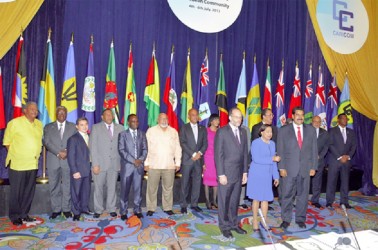Heads of Government of the Caribbean Community (CARICOM), on the final day of their Thirty-Fourth Regular Meeting on Saturday in Trinidad agreed on follow-up action on the question of reparations for native genocide and slavery.
A release from the Caricom Secretariat said that the Meeting agreed to the setting up of a National Reparations Committee in each Member State.
The Chair of each Committee will sit on a CARICOM Reparations Commission.

The Heads of Government of Barbados (Chair), St. Vincent and the Grenadines, Haiti, Guyana, Suriname and Trinidad and Tobago will offer political oversight, the release said.
The decisions that were adopted came after presentations by Member States, led by St. Vincent and the Grenadines, and their unanimous support of the road map.
Chair of Caricom, Trinidadian Prime Minister Kamla Persad-Bissessar at a press conference at the Hilton Hotel, described progress on the subject as a very positive outcome.
The Secretariat said that during his contribution to the discussions, Prime Minister Baldwin Spencer of Antigua said that he conceptualized the call for reparations as an integral aspect of the Community’s development strategy.
“We know that our constant search and struggle for development resources is linked directly to the historical inability of our nations to accumulate wealth from the efforts of our peoples during slavery and colonialism. These nations that have been the major producers of wealth for the European slave-owning economies during the enslavement and colonial periods entered Independence with dependency straddling their economic, cultural, social and even political lives”, Spencer said.
He added: “We, as political leaders, must encourage our various reparation agencies to continue the education of our Caribbean people and our Diaspora, and enhance their awareness of the reparations issue.
It is important that there is solid people and multi-party support for our efforts and we must impress on our colleagues in both Government and Opposition that this is not an issue we should use as party-politics fodder. Our various reparation organizations must see the forging of bi-partisan political support and civil society consensus for reparations as one of their main objectives”.





